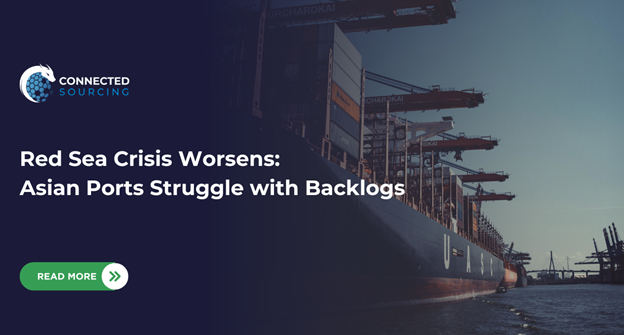
Shipping Delays Spread as Houthi Attacks Intensify
Major shipping company Maersk warns of potential delays in shipments due to ongoing attacks by the Houthi militia in the Red Sea. These attacks disrupt crucial shipping routes for Asian cargo vessels accessing the Suez Canal, forcing companies to take longer journeys and ultimately impacting consumers.
Earlier this month, Maersk notified customers that the expanded risk zone in the Red Sea will cause further delays and drive up shipping costs.
Houthi Attacks Force Rerouting, Lengthening Journeys
Since late last year, Houthi attacks have targeted ships in the Red Sea, a vital passage for Asian cargo vessels reaching the Suez Canal. This has forced ocean carriers to bypass the Red Sea altogether and take a significantly longer route around Africa’s southern tip to reach Europe. However, recent weeks have seen Houthi attempts to strike ships on this longer Indian Ocean route.
“As a result, our vessels have been compelled to extend their journeys even further,” Maersk stated, “leading to additional time and costs to deliver your cargo to its final destination.”
The Houthi attacks have created a dangerous situation for cargo ships in the Red Sea. To ensure crew and cargo safety, shipping companies like Maersk are forced to reroute vessels, significantly increasing travel distances. This translates to higher fuel costs and extended delivery times. Maersk estimates deploying extra ships and equipment on the Asia-Europe route could lead to a 15-20% industry-wide capacity drop in the next three months.
Asian Ports Buckle Under Backlog
The Red Sea crisis extends beyond shipping companies, impacting Asian ports as well. Delays and backlogs caused by the attacks have resulted in overflowing facilities in major Asian ports like Singapore, Shanghai, and those in the Middle East.
Industry experts note emerging congestion hotspots and a shift in cargo handling, with a trend towards consolidating cargo onto specific routes. This shift has significantly impacted Jebel Ali Port in Dubai, where ships now spend more time in port, straining trucking and storage capabilities.
A DP World spokesperson acknowledged, “Jebel Ali Port has seen a temporary increase in vessel arrivals due to recent severe weather and changes to regional shipping routes. We are working closely with our partners to ensure efficient operations and minimize any schedule disruptions. All major shipping lines continue to make on-time arrivals at Jebel Ali Port.”
Europe Braces for Impact
While European ports are not yet affected by the congestion in Asian ports as of now, they are expected to be impacted as delays in Asia ripple through the supply chain. This will likely translate to a domino effect: later deliveries for European consumers and businesses, potential stock shortages, and possible price hikes as retailers struggle to maintain inventory levels.
While the current situation in the Red Sea is out of our control, European businesses can anticipate possible challenges brought about by the ongoing crisis and take proactive steps to mitigate the impact on their supply chain. Some strategies to consider are: diversifying suppliers across different regions or countries, increasing inventory levels to prepare for possible shipping delays, and strengthening communication with suppliers and shipping companies.
Conclusion
The Red Sea crisis is an important reminder of how connected the global economy is. Disruptions in one region can quickly cascade across continents, impacting businesses and consumers worldwide. For cases like this, proactive measures in all stages of the supply chain are very important. Suppliers, shipping companies, and businesses alike must take the necessary steps to help lessen the severity of the coming challenges.
Furthermore, partnering with a reputable sourcing company like Connected Sourcing can provide businesses with expertise on how to navigate these disruptions. Connected Sourcing’s global network and experience in risk management can help businesses identify alternative suppliers, optimize inventory levels, and develop contingency plans to mitigate the impact of future disruptions. Send us a message to learn more.

